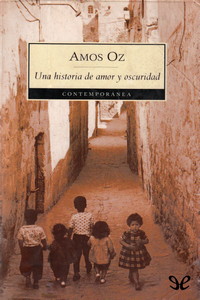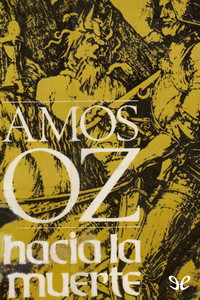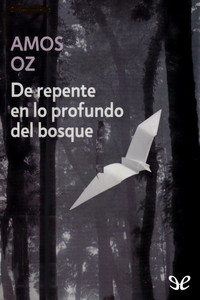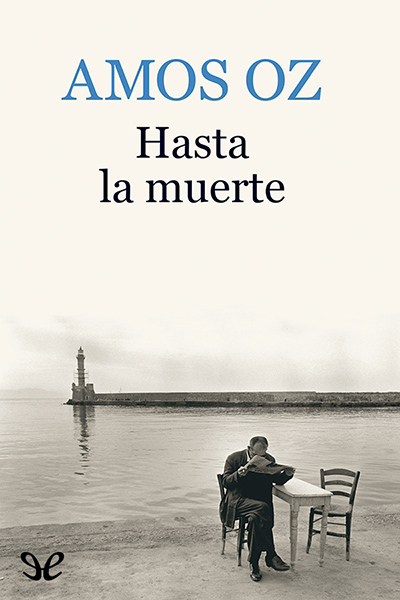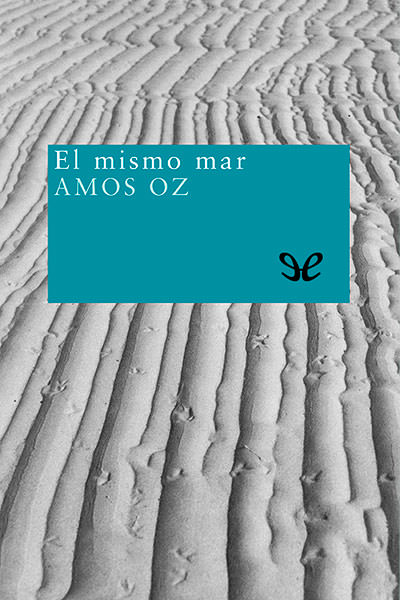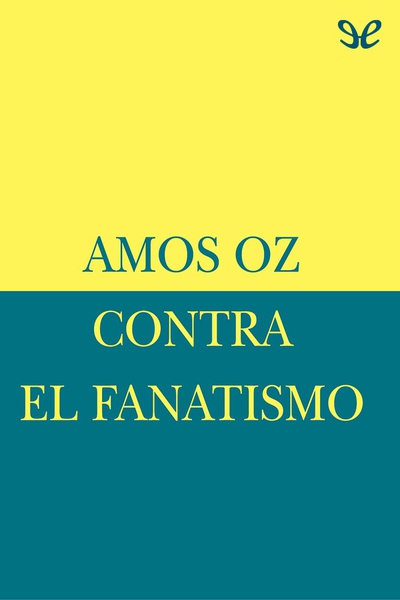oleebook.com
Inesperadament al fons del bosc de Amos Oz
de Amos Oz - Género: Fantástico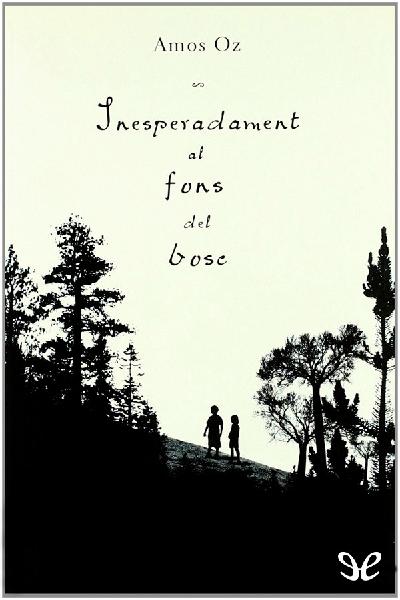
Sinopsis
Aquesta breu novel·la és una Aggadah, una paràbola, amb tot el seu simbolisme i càrrega metafòrica, que explica la història dun petit poble embruixat sobre el qual ha recaigut una estranya maledicció: la desaparició de tots els animals
Una faula per a totes les edats.
Libros Recomendados - Relacionados
Reseñas Varias sobre este libro
Un omaggio al compianto Amos Oz.
Ieri ha lasciato questa vita e ancora scriveva ed era attivo: voce illuminata in un eterno conflitto. Mi piace ricordarlo con questa fiaba adatta a ragazzi e anche agli adulti, un messaggio di speranza all'ombra di una catastrofe che intristisce tutti. La storia di un villaggio dell'incomunicabilità, di un luogo imprecisato dove gli adulti hanno paura e tacciono ai loro figli, non spiegano le misteriose ragioni del loro vivere, l'assenza degli animali nelle loro vite, il silenzio delle loro esistenze. Non spiegano neanche l'esistenza dei deboli e l'insorgere del necessario nitrillo in un bambino che vede oltre il mistero e cerca le ragioni. Ma si sa, meglio etichettare il diverso che scoprire una ferita purulenta. Va da sé allora che il coraggio arrivi da altri ragazzetti : Maya e Mati, curiosi e timorosi ma mai pavidi. Inizia allora la ricerca della verità...buona lettura all'insegna, oltre il già detto, di un inatteso messaggio ecologista. Io vi ho preferito l'accettazione del diverso. letto15 s Lisa Guidarini158 34
Fairy tales appear deceptively simple, when, in fact, the reverse is true. They must work on more than one level: they must include interesting characters and a fast-paced plot to keep children interested; a moral a child can identify, and often there is a third layer - a moral lesson for adults to dig into in more detail, a take-away life lesson, for lack of a better term, to keep the story compelling enough to keep the adult reader reading.
Suddenly in the Depths of the Forest is an intricate story with many plotlines interlaced. There is the primary, surface story about an isolated mountain town in which there are no animals, insects or life forms other than plants and humans, and along with that the bullying and ridicule suffered by anyone either outside the mainstream, or anyone who does not fall in line with those who've conveniently "forgotten" how the animals went missing in the first place. At this level there is significant tension within the community as those who remember are treated as though they are defective in some basic way. And, in fact, a few of them are eccentric to the point of being grotesque, such as the wife who pushes her husband around in a baby carriage as he makes sheep sounds, remembering but not quite remembering a time when there were animals on the farms.
Next, there's the relationship between Matti and Maya, two school children who care enough to pursue the question of what happened to the animals, despite vague warnings of the evil that lurks "out there," in the forest, and the legend of a creature so evil it wisks off every life form in its path. While Matti is by far the more cautious and afraid, his friend Maya takes the lead role when a decision must be made, becoming a strong female character when it's necessary for her to lead.
And, finally, the stories of both Nimi and Nehi, the two people farthest outside the mainstream, who chose to shun the villagers altogether rather than deal with being ostracized and ridiculed. Both of them are very close to the earth, perhaps pagan, and in touch with the pulse of nature. They are, as a result, the most feared characters.
The complexity of Oz's book is impressive, the world he's created authentic to the last detail. He's managed to be concise without skimping on either plot or character. His prose, as translated by Sondra Silverston, blends well with this sort of created folklore. It is lyrical in every positive way, never slowing down the pace of the story while creating a romantic, somewhat surreal world in which the impossible is possible.
The story also comes full circle, while leaving the ending ambiguous. Do Maya and Matti find a way to bring the animals home and restore their community, or are the forces of social pressure, and denial of culpability, too strong to overcome? It is an enjoyable, deep read, satisfying for a wide age range. Very highly recommended, especially to those interested in the fairy tale or fantasy genres.
netgalley review-book13 s Alejandro González Medina125 9
Me ha resultado muy grata la lectura de esta fábula contemporánea. Desde mi punto de vista, la verdadera grandeza de este género en la actualidad (cultivado por otros autores prestigiosos como Saramago, Coetzee, Bódor o Krasznahorkai) radica en que, más allá de las múltiples interpretaciones que deriven de la ambigüedad de un texto, este nos invita a una doble lectura. No encontramos la moraleja unívoca y final de las fábulas de Samaniego o de La Fontaine, sino dos mensajes que se entrecruzan como un bordado.
En esta obra de Amos Oz, encontramos a simple vista la defensa de la vida animal como valor en sí mismo y de la naturaleza como valor cultural, transmisible de generación en generación. En ese sentido, es una obra asequible incluso para lectores muy jóvenes, ya que el lenguaje está desprovisto de toda afectación y el mensaje que pretende transmitir reposa más bien en la emotividad que en el argumento filosófico complejo.
Junto a esa "moraleja", el tema del secreto sobrevuela las cabezas de todos los habitantes del pueblo, ese secreto fundacional de la comunidad del que hablaban Maurice Blanchot, Jean-Luc Nancy e incluso Derrida. Como secreto, es compartido y tiene su valor en que, conocido por todos, no debe ser mentado en voz alta. No es el secreto de lo desconocido, de lo misterioso, sino de lo silenciado. Hace de la comunidad lo que es en el momento de la narración y cualquier intento de socavar esa identidad comunitaria choca con el muro del silencio. ¿Podría relacionarse con la condición judía del autor y las primitivas sociedades perseguidas, cuya misma existencia era un secreto en el mismo seno de una sociedad perseguidora? Que el lector juzgue.13 s Ivana Books Are Magic523 243
One of the most beautiful fairy tales that I have ever read and I have read quite a few. One of those rare achievements, a profound work of literature that is accessible to both children and adults. in some classic fairy tale, its protagonists are two brave children, a boy and a girl. They live in a village from which all the animals disappeared long ago. Adults refuse to talk about this event, but they cant help to recall it at times. Only two adults, an old man and a spinster school teacher still talk about animals.
If other adults wont admit that there were animals among them, if they dont approve children learning or inquiring about them, they cannot completely hide a sense of emptiness and sorrow that accompanies the mere mentioning of other creatures. The adults cant help alluding to animals, mentioning them at least occasionally, thus confusing the children more. The disappearance of animals can have many metaphorical meanings. When you read this book, Im sure youll be able to come up with many interpretations yourself. For the sake of an introduction, perhaps it is enough to say that the disappearance of animals is a taboo. Oz managed to present a society that is ruled by fear, that is unable to face its past or speak of its taboos. A society that wont admit that there is something wrong. Now, isnt this often the case with human societies?
I mentioned that our protagonists are brave. As funny as it may seem, the foundation of this bravery seems to be fear. These two children arent afraid to admit they are afraid. Both of them are outcasts in a way. What makes them outcasts is nothing extraordinary. The boy, for instance, dreams of animals. He tells his dreams to other children, even if he knows he will be mocked. This boy and this girl are willing to face their fear. They are aware there are things they do not know about but they dont let that stop them. I think children will find it easy to relate to them. Their portrayal and character development is wonderful. Little by little, we get to see more, we get to know the souls and hearts of these two children.
There is simplicity in the writing, but the fact that it is written for children doesnt take anything from the beauty of the writing. Even without using big words, this novel is written in a very lyrical way. Its prose is enchanting and it flows ever so naturally. It invokes strong sensations and emotions, yet it does it so softly and effortlessly. Sinking into this world is so easy and it feels so natural, almost falling to sleep and dreaming a beautiful dream. Once you finish reading this novel, youll have a feeling that youve woken up from a dream. Not just any dream. One of those deeply meaningful dreams that made you realize something you failed to grasp while you were awake. One of those dreams that make your heart full.
I would make this book a mandatory reading in schools everywhere. Its speaks about bullying without bitterness, it speaks about love and friendship without sentimentality, it speaks about the need to overcome our fears without being pretentious. This fairy tale manages to explore in depth so many difficult yet important subject, that I cannot call it anything else but amazing. The story is well constructed and is surely capable of keeping the full attention of reader (whatever age he/she might be). Moreover, it conveys such a powerful message of hope. I read it in a heartbeat. It warmed my heart. It uplifted my spirit. Read it to your children. If you dont have any, read it to your baby cuisines or children of your friends. Read it to yourself. Let the message sink in deep.
10 s Meredith421 87
Matti and Maya, two children who live in a village in which all the animals disappeared years before they were born, set out on a quest up the mountainside to meet Nehi the Demon, who is responsible for the animals' disappearance.
Oh book, I am disappointed. This had such potential, but the story itself was so full of problems, that I just didn't enjoy it at all. The author wrote with such a passive style, that I often found myself zoning out and having to re-read passages two or three times. I don't enjoy having to force myself to remain engaged with a book.
There were also times in which the plot was sorely lacking in detail, and I had to check to make sure I hadn't accidentally skipped several pages. There were other times where the author needlessly described the same character or situation, over and over again, or anthropomorphized objects or animals in weird, abstract ways that made absolutely no sense.
I'm not sure if certain aspects of this story were simply lost in the translation from Hebrew to English, or what, but I think this needed to spend a few more months on the drawing board before publication.fantasy j-fic9 s Fal? VictorAuthor 1 book67
Am r?mas pur ?i simplu fermecat de c?r?ulia care pare a fi destinat? copiilor, cu o moral? bine descifrabil?, dar care poate înmuia ?i inima unui adult cu u?urin??.7 s ?iman Daria74 55
o d? spre 2,5/5??6 s Tsung275 70
This is an enchanting fable, targeted at the younger reader, yet it has themes which might require a bit more maturity for understanding.
Starting off in an isolated village near a mysterious forest, we soon learn that this is no ordinary village. Curious things have happened. The most puzzling being all the animals, birds and insects vanishing, leaving the older generation with vague memories of the creatures and the younger generation with myths and legends. It is up to the heroine, an intrepid girl called Maya, to unravel this mystery. Her faithful sidekick is a boy called Matti, who although supportive but has much less gumption than Maya.
The main theme of the story is that everyone should be treated fairly, even if they look or act differently from the majority. No one should be ridiculed, ostracized or discriminated against.
And how would we live and amuse ourselves without occasionally humiliating someone? Without a touch of abuse, without mockery, without occasionally stepping on someone else?
but from the time were little, were taught to be ashamed of the truth and take pride in lies. And they train us not to be happy about what we have, but only about what we have that others dont. And even worse, they teach us from the moment were born to believe all sorts of poisonous ideas that always begin with the words, After all, everyone
Almost all the named characters in the story had been ridiculed or mocked in one way or another. The characters also responded in different ways. The older ones would carry on and just live with their memories. The younger ones would run away.
Parallel to that, was that marginalized people also should not seek revenge on the majority but reconciliation. I wonder if Oz had a particular group of real people in mind.
There were subtle biblical references, recurring themes of remembering and forgetting and a brief mention about the language of animals.
Until one day, there might be a change of heart, and then well come down from the mountain and maybe a new heart will be born in all the people and animals and birds, and all the meat-eaters will get used to eating beefberries instead of preying on other animals.
the things they tried very hard to remember sometimes eluded them and hid deep under the blanket of forgetfulness. And the things they decided theyd be much better off forgetting were the ones that would rise out of the forgetfulness as if to deliberately upset them.
The prose is simple and easy to read. The suspense builds up nicely all the way but somehow the ending was underwhelming. The conclusion could have been better and would have capped off and otherwise captivating book.
5 s Pat418 106
p. 15. Gli adulti ancora in grado di ricordare di solito preferivano tacere. Negare. Far finta di avere dimenticato.
Accade a chi non riesce a penetrare nel folto del bosco. Accade a chi fugge, a chi ha paura. Accade ai vigliacchi.
I vigliacchi che negano, tacciono e fingono di non ricordare illudendosi di poter così cancellare quella coltre di fango che lorda la coscienza.
Solo i puri intraprendono il viaggio. Ci va coraggio e sensibilità. Doti che hanno solo i bambini e gli animali. E tutte le anime belle che riescono a mantenere il cuore bambino fino allultimo istante. Solo loro non verranno contagiati dal morbo dello spregio e delle beffe.
Chi penetra nel folto del bosco scoprirà che la diversità non ha odore ripugnante né voce spaventosa, ma profumo che addolcisce laria e voce amorevole. Chi penetra il folto del bosco scoprirà che la libertà è un balsamo che, con malinconica dolcezza, lenisce le ferite dellanima e della mente. Ma per guarire quelle ferite serve la forza dellinnocenza, la potenza dellamicizia, la delicatezza dellaccettazione.
Una favola per adulti da leggere con tutto lamore possibile ai più piccoli.
israele6 s Marina Di Clemente236 16
Avevo trovato per caso su una bancarella questo libro e l'ho preso un po' per curiosità verso l'Autore scomparso recentemente ed un po' per la bellissima copertina. Ho scoperto una storia che parla ai ragazzi ma non solo, si tratta di una storia che tutti possono leggere e che mantiene un certo mistero e coltiva la curiosità pagina dopo pagina ed il finale ha un bel messaggio per gli esseri umani.
Se amate le creature del bosco ed il bosco stesso, se volete leggere un libro breve ma intenso allora questa lettura è per Voi!5 s Balu339 5
Not one detail in this book was not planned. You can see how much Oz stuck to his ideas, and how well he developed them. Also, the story was beautiful and touching. Only thing I overall did not was execution of those ideas. Writing style was phenomenal at times, but sometimes also bland and repetitive. This was my first Oz book, and I really hope that this is not his regular writing style. Rating: 3.67 s MihaElla 243 453
...please be very careful not to infect yourself with the disease of humiliation and mockery. On the contrary, little by little, maybe you will try to remove your friends, at least some of them, from this very bad habit. Talk to them. Talk to those who insult or even those who hit or rejoice when they witness someone else's trouble. Talk to anyone who is willing to listen. Try to talk even with those who laugh at you, who condemn and humiliate you. Do not give them importance, but try to talk to them again and again...8 s1 comment Anaarecarti119 49
Î?i mai aminte?ti sentimentele care te încercau în copil?rie când citeai o poveste frumoas?? Abandonul total, cufundarea în lectur? care anula senza?iile de foame, de sete ori de somn, teama care te sufoca dac? te trezeai fa?? în fa?? cu vreun monstru, curajul în fa?a obstacolelor, nesiguran?a, când eroii prefera?i trebuiau s? fac? alegeri, u?urarea, când totul se termina cu bine, dezam?girea, când d?deai ultima pagin? ? A? fi vrut s? fiu din nou mic? ?i s? citesc cu mintea de atunci necoapt?, neformat? cartea lui Oz (care e un adev?rat vr?jitor al pove?tilor, mi-e clar), pentru c? atunci, a? fi fost pe deplin fericit?.
Recenzia completa pe https://anaarecarti.ro/main/deodata-i...20185 s Lectora brújula 989 94
El escenario en el que transcurre esta parábola es un pueblo maldito, silencioso y triste. Nehi, el diablo de la montaña, baja de su palacio negro cada noche y pasea como un espíritu maligno en busca de algún signo de vida. Eso cuentan los padres a sus hijos. Los adultos fingen haber olvidado que los animales desaparecieron hace años, durante aquella noche maldita en la que pasaron cosas de las que no pueden sentirse orgullosos. No hablan de ello, al menos en presencia de los niños.
Los únicos que hablan de la extraña desaparición son tachados de locos y viven solitarios al margen del la sociedad. Cuando el pequeño Nimi empezó a soñar con animales, los niños despreciables de su clase le hicieron bullying hasta que el pequeño, antes risueño y optimista, huyó del pueblo y se adentró solo en el bosque.
Mati y Maya, compañeros del niño desaparecido, se adentran en lo profundo del bosque pese a las advertencias de los adultos, precisamente para descubrir los secretos que esconden. A diferencia de otros niños, son curiosos e inocentes, y desafían las normas para buscar respuestas.
Su historia es un cuento oscuro de fantasía con muchísimo trasfondo social: los protagonistas critican duramente a quienes se burlan de las personas "no normales" que no encajan en el grupo social. Los que aun tienen esperanza son objeto de burlas, incluso los más pequeños aíslan al que piensa diferente.
No es una narrativa puramente lineal, los capítulos mezclan lo que está sucediendo con divagaciones y recuerdos. Es un cuento adornado con muchas historias personales, aunque no sobra nada y en absoluto es un relato confuso. Si tengo que ponerle un pero, las descripciones del bosque son extensas y la variedad me ha sacado del lugar.
Es un libro con moraleja, el misterioso diablo de la montaña defiende la preservación de la naturaleza y condena el maltrato animal. Su mensaje nos recuerda que todos somos seres vivos, estamos en el mismo barco y merecemos el mismo respeto.4 s Rainb0warri0r708 181
Ben lontano dai più caratteristici romanzi di Oz, D'un tratto nel folto del bosco è un affettuoso omaggio alla tradizione fiabesca, un inno alla capacità immaginativa dei bambini, alla loro spensierata innocenza che si traduce in uno scenario bucolico e arcadico, che sa di tempi lontani e andati.
Un villaggio, un bosco, un mistero - l'improvvisa, inspiegabile scomparsa degli animali. Nel rispetto affezionato del canone, Oz delinea in maniera netta i confini allegorici del piccolo villagio e del bosco oscuro e misterioso, del giorno in cui tutto è ammissibile e della notte in cui accade l'inverosimile. E, come nella tradizione fiabesca, gli animali sono creature altrettanto metaforiche, innocenza selvatica che cammina su quattro zampe, con un suo proprio linguaggio - proprio il linguaggio segreto che i piccoli protagonisti del romanzo scoprono e imparano a usare.
Una favola dolce, dal sapore antico, vestigia di una perduta età dell'oro, estremamente nostalgica; ma un autore come Oz non avrebbe potuto limitarsi a riproporre una storia classica, trita e ritrita. D'un tratto nel folto del bosco è di più, molto di più: in un paese dilaniato da un eterno conflitto emotivo, anche la più semplice fiaba diventa un mezzo per parlare della diversità, dell'isolamento, dell'esclusione. Isolamento non solo dei bambini dagli adulti, ma tra i bambini stessi, capaci di una crudeltà che si è sempre restii a riconoscere. Quella di Maya e Mati è dunque la storia di una presa di coscienza, la storia dell'affermazione dell'identità; nella scelta estrema di violare i confini, i due ragazzini affermano se stessi, contro chiunque li chiami "diversi", scoprendo un linguaggio, quello animale, che non conosce la parola "normale", e con esso la libertà.israeliani kids4 s Sofia Fresia1,179 24
2,5 stelle. Mi aspettavo molto di più da questo testo, il finale soprattutto mi ha deluso parecchio. Non avevo idea di come si sarebbe potuta evolvere la vicenda data una premessa di partenza così intrigante, però mi è sembrato che anche l'autore sia incappato nel mio stesso problema... Comunque alcuni aspetti positivi ci sono stati, tipo la forma narrativa e diversi messaggi che l'autore vuole trasmettere. Abbiamo tra le mani una vera e propria favola nera, che riprende lo stile narrativo tipico delle fiabe classiche sia per linguaggio che per contenuti (si parla di un bosco oscuro e pericoloso, di un mistero accaduto nel passato che tutti vogliono dimenticare, di un'entità malefica annidata nell'oscurità della foresta..) e il ruolo centrale e' svolto da animali e bambini. Sono loro gli unici protagonisti, il resto è sfondo che contribuisce a creare l'atmosfera surreale e fiabesca della storia. Non avevo letto nulla di Amos Oz prima di questo, e visto che la trama era particolarmente intrigante -una terra dove da anni non vive più nessun tipo di animale a causa di qualcosa di oscuro legato alla cattiveria degli uomini - mi sembrava interessante partire da qui. Non so però se sia stata una scelta azzeccata...4 s Israel280
Para ser mi primera aproximación a la obra de Oz, he de decir que me he quedado ampliamente satisfecho con lo leído. Una pequeña fábula, dulcemente contada, que se lee de una sentada, y que aun así consigue intrigarte, emocionarte, y devorar página tras página para ver que es lo que ocurre en el extraño pueblo en el que sucede la historia.
Y aun así, y con todo, la historia te deja un poso de malestar, un resquemor en lo más hondo del alma, ya que, bajo toda la trama, lo que subyace realmente es el auténtico y genuino comportamiento humano; ese que, de una forma o de otra, nos hace creer que somos libres y únicos pero, al mismo tiempo, nos martillea en el cerebro, en lo más hondo de nuestro espíritu, con sensaciones que nos hacen darnos cuenta, aunque intentemos olvidarlo, que esa libertad de la que nos vanagloriamos no es más que un espejismo que, por duro que parezca, no desaparece ni en lo más profundo del bosque...4 s Yuko86115 181
Non avevo mai letto nulla di Amos Oz, e sinceramente, dopo aver letto questo libretto, non so se e quando gli darò unaltra possibilità. Le premesse erano buone, le prime pagine accattivanti, in un certo senso magiche: ma poi tutto diventa di una noia mortale! Lautore non fa che ripetere in continuazione le stesse cose, rendendo la lettura pesante e per nulla interessante: la morale presente è sicuramente importante, ma uno arriva al termine della lettura talmente estenuato da farci a malapena caso. Per fortuna era breve!
Apprezzo fiabe e favole, ma questa si potrebbe usare unicamente per far addormentare i bambini in men che non si dica: ho rischiato più volte di addormentarmi anchio!fantasy read-in-20124 s Alessandra Jarreta209 37
Uma fábula maravilhosa, de tocar o coração <3. A escrita do autor israelense é fantástica, não tem como parar de ler. Ansiosa para ler mais coisas dele. Recomendado <3 4 s Márcio565 1 follower
Em uma pequena vila na qual animais não mais existem, duas crianças, Maia e Mati, querem descobrir mais acerca dessa história, sendo que os adultos atribuem tal desaparecimento ao demônio Nehi, que vive nas profundezas do bosque próximo.
Por detrás de sua fábula, Amos Oz trata de questões que são bastante correntes, como o tratamento desumano que muitas vezes impomos aos demais (bullying, como exemplo), mas também sobre a forma como nos apropriamos da natureza como se propriedade nossa fosse e como se essa apropriação não tivesse consequências.
Mesmo que contado em forma de fábula, o seu desenvolvimento fica a desejar, há por vezes excesso de repetição de situações, outras colocações não são resolvidas (Mati tem sempre a sensação de já ter estado nos domínios de Nehi, mas isso fica sem resolução), que deixam a desejar.
2 s Fábio237 16
Como as boas fábulas, De repente, nas profundezas do bosque é destinada às crianças mas tem muito a dizer aos adultos. Amós Oz nos confronta com o fato de que nosso conformismo esgota a nossa própria existência, pois [ ] nos acostumaram, desde pequenos, a ter vergonha de tudo que é verdadeiro, e a louvar tudo que é falso. E nos acostumaram a só nos alegrarmos com o que temos, se o que temos for só nosso e de mais ninguém.
Que possamos ter a sabedoria das árvores, a pureza dos animais e a coragem das crianças. Isso e nada mais.lidos-20193 s Camille501 56
La plume d'Amos Oz nous livre un conte fantastique très agréable à lire. Dans un village de montagne, tous les animaux ont disparu il y a si longtemps que seuls les adultes s'en souviennent (mais souhaitent également l'oublier). Deux enfants s'aventurent dans la forêt où, paraît-il, une créature terrifiante règne dès la tombée de la nuit. Ce livre propose un bel hymne à la tolérance mais j'ai eu aussi envie d'y voir une petite incitation au végétarisme !21e-siècle contes-nouvelles litt-israel3 s Lara Verì44 22
Non il mio genere ma sicuramente molto profondi i messaggi che Oz voleva lasciare nonostante siano stati a volte quasi ripetitivi. Nel complesso però, sicuramente una dolce fiaba della buonanotte!3 s Melissa Roach52 2
Description:
In a gray and gloomy village, all of the animalsfrom dogs and cats to fish and snailsdisappeared years before. No one talks about it and no one knows why, though everyone agrees that the village has been cursed. But when two children see a fisha tiny one and just for a secondthey become determined to unravel the mystery of where the animals have gone. And so they travel into the depths of the forest with that mission in mind, terrified and hopeful about what they may encounter.
From the internationally bestselling author Amos Oz, this is a hauntingly beautiful fable for both children and adults about tolerance, loneliness, denial, and remembrance.
I have actually never heard of Amos Oz, so I am not really aware of his fame or books. This book which is targeted more towards upper elementary age, has an edge of mystery and fantasy at the same time.
The author shares a story that begins in a village entirely without animals. No one really knows what happened to them - and even most of the adults act as if they never really existed. Its as if they have a secret of their own. A few older inhabitants, such as Emanuella the teacher or Almon the Fisherman, still remember what dogs, cats, and goats looked and sounded , but people treat their memories with unconvinced indulgence. Almon, of course, is no longer a fisherman because there are no longer fish to catch; he spends his days talking to his scarecrow, even though there are no birds to scare away. No woodworm, either, to send him to sleep with the sound of their gentle chomping on his furniture. One night, all the animals suddenly disappeared, taken up presumably into the dark forest-clad mountains surrounding the village. The inhabitants lock their doors securely at night, for Nehi the Demon is liable to come prowling and snatch children away, as he has already taken the animals (which again, is treated as a folk tale that the adults take very seriously).
Two children, Matti and Maya (who are friends) share a secret and decide that they must go find out for themselves what happened to all of the living (non-human) creatures. They discover so many things at the top of the forest...but you will have to read the book for yourself to find out!
Mr. Oz's Hebrew translates beautifully as he contrasts humans with lower animals: "the languages of animals and birds have many fewer words than the languages of people, and they have only the present tense, there's no past or future at all, and they have only verbs, nouns, and interjections, no other forms. . . Creatures even have special words that express joy, excitement, amazement, and pleasure. . . Other creatures even have certain words that resemble prayer: special words of thanks for the sunlight. . . And they have words of longing. But none of the creatures' languages have any words meant to humiliate or ridicule."
At the heart of this little gem of a story is Mr. Oz's message: we should not ridicule or humiliate those of us who are different. And he asks a hard question: if we are humiliated or reviled, are we justified in running away and/or seeking revenge? In his perfect world we would not eat the lower animals either.
Mr. Oz works his magic by the things that happen in the forest, certainly a device that has been used by writers of all nations and ages from Dante to Hawthorne. He contrasts the mystery and danger of the forest with the beauty and sublimity of a garden, another device as old as the Genesis story.
My thoughts:The first half of the book was enchanting...written in beautiful imagery, and I was very curious to learn about all of the people who lived in the village - as well as the mystery of what happens at night, where did all of the animals go, and who was Nehi the demon?
The plot is very captivating, and makes you yearn for more...but I have to say that I was a little disappointed with the ending - I felt that I did not get my questions answered. I won't share them here, for sake of ruining the book for you future readers...but I just don't understand why it ended that way.
To read more about the book: http://www.hmhbooks.com/catalog/title...
Find it on Amazon (Will be published: 3/21/11): http://www.amazon.com/Suddenly-Depths...
Thank You so much Net Galley and Houghton Mifflin Harcourt for allowing me to read this book! I cannot wait to read more books from you in the future!
Disclosure of Material Connection: I received this book free from the publisher through the Net Galley review bloggers program. I was not required to write a positive review. The opinions I have expressed are my own. I am disclosing this in accordance with the Federal Trade Commission's 16 CFR, Part 255 : "Guides Concerning the Use of Endorsements and Testimonials in Advertising." 3 s Cristian1185375 32
Una Aggadah. Una parábola. Una enseñanza.
De repente en lo profundo del bosque nos entrega una historia clara, sencilla y directa al corazón de quien la lee, provocando profundas reflexiones a partir de pasajes que nos retraen a las simples verdades que nos recuerdan que la empatia y la consideración son insumos vitales para una existencia y convivencia plena. Un llamado a profundizar en las motivaciones de nuestros actos, ya sea para consigo mismo, o en relación con los demás.
Sus lineas nos presentan personajes y momentos radiantes de ternura, valor y amistad, como así también actitudes y costumbres dignas de rechazo y revisión. Todo esto bajo un misterioso acontecimiento que particulariza el imaginario de todo un pueblo víctima (o tal vez victimario?) de extraños sucesos.
La historia inmediatamente atrapa y presenta suministros que permiten reflexionar detenidamente en los temas que se desligan de su trama, sin embargos a ratos pierde intensidad en devaneos, que personalmente, percibo que no aportan a la narración en su conjunto.3 s Carol Catinari447 2
An intriguing premise. There are no longer any animals in this particular village... and the allegory begins. Nicely written also. This is written for young readers and billed as a fable for the younger set, allegory for adult.3 s Tammar8 2
this is the kind of book in which the meaning , the saying of the book is not in the actions and the happenings, but in the hidden meaning behind them. yet, it is very breezy to read and does not reach the cluttered heaviness other philosophical oriented books tend to do.fairy-tales3 s Lucian Bogdan359 21
Dac? textul a avut ?i un alt mesaj în afara celui c? unii oameni prefer? s? fie naivi decât s? se adapteze la via?? (iar eu ar trebui s? simt empatie fa?? de ei), nu l-am observat. Un stil haotic, o ac?iune incoerent?, personaje lipsite de profunzime ?i ni?te erori de logic? îngrozitoare (de?i nu mai exist? animale, p?s?ri, pe?ti, viermi, insecte - plantele dau rod, probabil polenizate de Sfântul Duh; satul e izolat în mijlocul p?durii, dar are caiete, c?r?i, scaune cu rotile, lumin? - nu se specific? dac? e electric?, dar nici lumân?ri n-ar fi avut cum s? fac?, f?r? cear?; un ins se gânde?te s? mearg? în aval ca s? vad? de ce nu mai sunt pe?ti; habar n-am cum se descompuneau cadavrele; când întâlne?te pentru prima dat? un animal, un personaj e uimit s? vad? cum i se umfl?/dezumfl? corpul în ritmul respira?iei, pentru c?, aparent, nu mai v?zuse asta la nicio fiin?? pân? atunci - ceea ce m? face s? m? întreb cum respirau ceilal?i oameni din sat, etc.). Problemele cu limba român? ale traduc?torului au fost în ton cu dezastrul general.2 s Ermina300 3
Pri?a o bullyingu i Noinoj umi obojena PETA-inim kampanjskim bojama, sa svim tehni?kim nevaljalostima, zasluuje samo jednu zvijezdu.
U jednom selu nestanu sve ivotinje i kroz pri?u nam se otkriva da su nestale zbog ?ovjeka, koji je ujedno i planinski duh (?). Pobjegao je u umu jer su mu se rugali. Sve ivotinje su krenule za njim. Okej, pri?a o Noi, moda i o nekom prvom jeziku, ali ?emu sve na kraju? Roman jeste hibridna forma, ali to ne zna?i da se moe napraviti dobar bu?kuri od razbacanih biblijskih motiva, neopravdanosti doga?aja i slabe veze uzroka i posljedice. Ako je ovo pri?a za djecu, onda je napisana iz pera knjievnog djeteta.no-no2 s Alina Cristea249 30
Autor del comentario:
=================================



